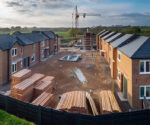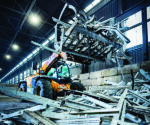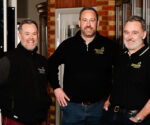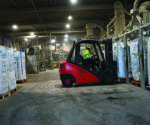Swisspacer reveals smart solutions are the future for the window industry
 Digitalisation and the ‘Internet of Things’ is rapidly gaining in importance, becoming the touchstone for the future viability of many companies in the window and façade building industry. What radical changes are already happening? That was the subject for several experts’ discussions at SWISSPACER’s fenestra-vision: smart windows, façades and innovative materials.
Digitalisation and the ‘Internet of Things’ is rapidly gaining in importance, becoming the touchstone for the future viability of many companies in the window and façade building industry. What radical changes are already happening? That was the subject for several experts’ discussions at SWISSPACER’s fenestra-vision: smart windows, façades and innovative materials.
With the Symposium in its third year, SWISSPACER invited leading industry experts to Salzburg including window and façades builders, window systems companies, planners and scientists to discuss the looming changes to the industry. All agreed that digitalisation is inevitable.
Keynote speaker Dr. Eckhard Keill, Chairman of the Board of Roto Frank AG, discussed the technology behind the latest smart homes, and the potential obstacles and risks. According to a recent study by Gartner, the demand for smart homes and the public perception and understanding of them is approaching its peak – yet the market will not be ready for new developments for another five years.
Particular emphasis was placed on the abilities of the individuals involved along the ‘value chain’, all the way down to the window installer. Experts at the Symposium were all in agreement that new, attractive professions will be created in this new era, such as System Integrators.
Andreas Bittis, Product Manager at Saint-Gobain Building Glass, outlined an exciting scenario in terms of intelligent products and processes during his presentation. The focus is not only on smart solutions, such as switchable glass, but primarily on communication between components, disciplines and users, as well as the availability of more information resulting from this. An intelligent RFID chip, for example, makes seamless documentation of the process possible – from the production of a window, to user behaviour, maintenance cycles, all the way to disposal. Based on this information, Andreas is convinced that new business models can be created.
“The window industry will not be able to enjoy the stability of recent years for much longer,” warned Jochen Wilms, founder of W Ventures. He highlighted just how quickly a market can turn: within five years, Google, Facebook, Microsoft and more have replaced industry heavyweights like Shell or Texaco as the most valuable companies in the world.
The window and façades industry will take on special responsibility here as it could control buildings via the building envelope. Jochen encouraged the construction industry to form a “Star Alliance” to adequately address the pending upheavals.
Maarten Verhezen, Manager at Nest, the smart thermostat, highlighted the shift in perspective his company has experienced. The brand, which belongs to the Google parent company, alphabet, has taken a user-centric point of view as the focus of its business model. People should feel at home – with home automation products that simply work and are visually attractive. Some 1,000 engineers work on smart home solutions at Nest, across sectors such as energy, online or retail. He claimed that “Nest wants to create a construction industry network.”
Schüco, an aluminium window systems manufacturer, has already made one giant leap towards digitalisation by launching Schüco Digital as an independent business unit that bundles all these activities. Prof. Winfrid Heusler, Senior Vice President Global Building Excellence at Schüco stressed in his presentation that “components across various sectors are needed to successfully tackle interdisciplinary challenges. Combining the real and virtual world will have a disruptive impact on the construction industry.”
The benefits of a ‘digital twin’ were highlighted by Prof. Klaus Sedlbauer, Head of the Fraunhofer Institute for Building Physics (IBP). ‘Digital twins’ can be used as a basis for planning, to simulate aspects of use and coordinate technical construction solutions that can mimic the reaction of external conditions.
Prof. Klaus Peter Sedlbauer introduced the topic of smart building materials. Building envelopes of the future will manage functions like a human body, and it will be the façade that controls the building. Intelligent components, such as textile façades, will also make a contribution here.
The final panel of experts, moderated by Prof. Sieberath, head of the ift Rosenheim Institute, discussed possible developments in relation to PVC as a profile material. There was a strong consensus that this is one material will not be replaced even in the coming decades. Arno Bender, Head of System Support at Aluplast, comments: “The benefits of recyclability are great – ultimately, all PVC frames removed can be recycled in full.”
The experts also came together to cast a first glance towards the Fensterbau Frontale trade show, where there are new developments in adhesive technology and new BIM solutions from Aluplast, as well as 76 and 88mm systems from Profine that provide a better solution with components.
Visit www.swisspacer.com for further information.











